
A Laparoscopic Colostomy is a surgical procedure which makes a temporary or permanent opening called as a stoma in the abdomen. During Laparoscopic Colostomy procedure, one end of the colon is diverted through an incision in the abdominal wall to create a stoma. A stoma is a way created from the large intestine to the outside of abdomen where a pouch for collecting feces is attached. Laparoscopic Colostomy is mainly performed to correct problems with the lower digestive tract.
Dr Gaurav Mishra is a skillful Laparoscopic Surgeon and Colo-proctologist in Mumbai. He is a skillful and well experienced in the treatment of colon, rectum and anus diseases. Dr Gaurav Mishra has performed lots of complicated Laparoscopic Colostomy surgeries successfully.
Need of Laparoscopic Colostomy
Laparoscopic Colostomy is mainly performed due to the problems with the lower bowel. Laparoscopic surgeon performs permanent or temporary colostomy depending on the type of disease. Laparoscopic Colostomy is performed due to various problems including:
- A large intestine blockage or injury
- Crohn’s disease which is an autoimmune form of inflammatory bowel disease
- Colorectal or Colon cancer
- Colonic polyps
- Diverticulitis
- Imperforate anus or other birth defects
- Irritable bowel syndrome
- Ulcerative colitis
- A part of the large intestine is surgically removed
- A ruptured colon causes an abdominal infection
Types of Laparoscopic Colostomy
Types of laparoscopic colostomy are mainly depending on the section of the colon where colostomy is performed.
- Sigmoid Colostomy
This is the most common type. It is located in the bottom portion of the large intestine.
- Transverse Colostomy
In a transverse colostomy, the stool leaves the colon through the stoma before reaching the downside colon.
- Loop Colostomy
Loop colostomy creates a stoma through which stool exits. In this type, the colon remained connected to the rectum.
- Single Barrel Colostomy
This type of colostomy is permanent. This surgery involves removal of colon including the rectum and anal opening.
- Double Barrel Colostomy
This type of transverse colostomy is very rare. In this surgery, colon id divided into two ends which form separate stomas.
- Descending Colostomy
This is the more common type of colostomy. The descending colon takes waste down the left side of the abdomen.
- Ascending Colostomy
In this procedure, only part of the colon remains functional so that waste discharge is usually liquid.
Procedure of Laparoscopic Colostomy
- Before Laparoscopic Colostomy, the Laparoscopic Surgeon performs physical examination and takes blood samples to review complete medical history of a patient.
- Patient has to inform laparoscopic surgeon about any past diseases and surgery to avoid any complications during the laparoscopic colostomy.
- Laparoscopic surgeon asks patient for fasting at least 12 hours before surgery.
- Before surgery, patient is given general anesthesia. The laparoscopic surgeon makes small incisions in the abdomen. This surgery is performed by laparoscope. The laparoscope is a small surgical tool and camera is inserted through this incision. The camera is used to guide laparoscopic surgeon during the surgery.
- During the laparoscopic colostomy procedure, laparoscopic surgeon locates the ideal part of the large intestine for the opening or stoma. Then a surgeon cuts the intestine in the appropriate area and brings it through abdominal wall.
- Finally the laparoscopic surgeon, surgically implant a ring onto the abdominal wall. This ring holds the end of the intestine in place and ring can be placed permanently or temporarily which help skin to heal around exposed intestine.
Benefits of Laparoscopic Colostomy
Laparoscopic Colostomy is more beneficial than traditional colostomy. Laparoscopic Colostomy has various advantages over open surgery including:
- Less pain
- Minimal blood loss
- Faster recovery
- No chances of infection
- No scarring or no tissue cutting
- Less hospital stay
Dr Gaurav Mishra is a highly experienced and proficient Laparoscopic Surgeon in Mumbai. He is an expert in the colon, rectum, anal and stomach diseases. Dr Gaurav Mishra’s Saraswati Nursing Home in Mumbai is a well equipped with modern medical technology to provide advanced Laparoscopic treatments to all types of stomach diseases. Dr Gaurav Mishra has a comprehensive knowledge of colon, rectum, anal and stomach diseases. He has a good experience about laparoscopic procedures involved in the diagnosis and treatment of anal, rectum, colon and Stomach diseases.
